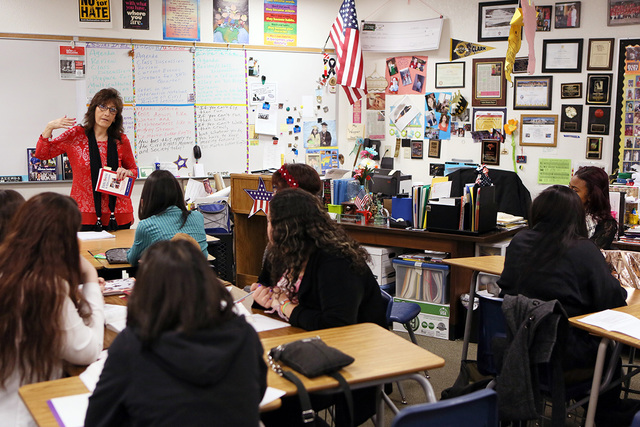Changing school start times sparks lively debate in Nevada Legislature hearing



A high school student’s day wouldn’t start until 9 a.m. at the earliest under two bills being considered in the Nevada Assembly.
The sponsors for Assembly bills 166 and 225, say the later start times would benefit teenage learning. But the bills were met by stiff resistance from lawmakers, school districts and parents during a lively hearing Monday afternoon at the Nevada Legislature.
School districts across the state mostly use staggered start times for the three levels of schooling: about 7 a.m. for high schools, 8 a.m. for middle schools and 9 a.m. for elementary schools. The staggered schedule saves the districts money by allowing the same buses to be used for all three levels.
But Assemblyman Chris Edwards, R-Las Vegas, said the commonly used schedule is not optimal for student learning.
“In fact, it’s backwards,” Edwards told the Assembly Committee on Education during a hearing on AB166.
AB166, sponsored by Edwards, would have elementary schools start earlier and high schools later. AB225, sponsored by Assemblyman Richard Carrillo, D-Las Vegas, would force high schools across the state to start no earlier than 9 a.m.
Edwards cited research that suggests that pre-adolescent students are more alert and awake in the early morning hours than their older counterparts.
AB166 also includes language that would mandate 30 minutes of recess each day for non-kindergarten elementary school students. It would also force schools who provide free breakfast to students to add 15 minutes of classroom time each day.
The bill will be amended to exclude charter and private schools from the bill’s mandates, Edwards said.
Assemblywoman Heidi Swank, D-Las Vegas, expressed concerns about the younger children getting out of school first.
Having high school students out earlier gives parents some flexibility because older children can be home to watch their younger siblings, Swank argued. Later school days could also interfere with student employment opportunities.
Skyler Bradley, a 17-year-old senior at Las Vegas Academy and Nevada Youth Senator, testified in favor of the AB225, saying he regularly sees classmates fall asleep in class.
Bradley cited a study of a Kentucky county that pushed school start times back one hour. That study found a nearly 18 percent reduction in teenage car crashes in that county.
“Late school start times are worth it in the long run when considering health and education factors,” Bradley said.
Estrella Gomez, a 33-year-old mother of four from Las Vegas, testified against AB166. She said she doesn’t think school should coddle students by letting them sleep in because it won’t prepare them for the working world.
“We need to teach our children that they need to learn how to get up in the morning to be ready for these jobs,” Gomez said.
Representatives from the Clark and Washoe county school districts testified against the bills, saying it would be too burdensome for the larger districts who are strapped for resources and would put a strain on after-school programs and sports.
Edwards and Carrillo both argued that school districts and the state need to be less focused on logistics and costs if the move would benefit student education.
Contact Colton Lochhead at clochhead@reviewjournal.com or 702-383-4683. Follow @ColtonLochhead on Twitter.
Assembly Bill 166 proposed school start times
Elementary schools: 7:30-8 a.m.
Middle schools: 8:15-8:45 a.m.
High schools: 9-9:30 a.m.












